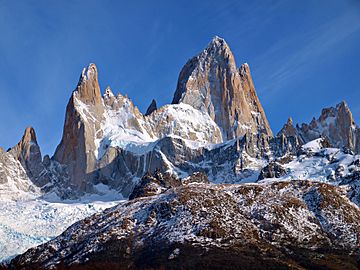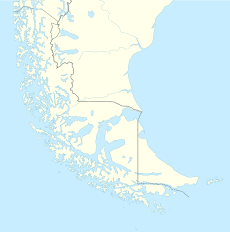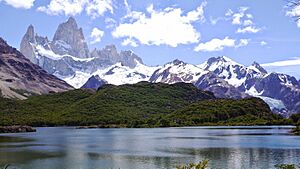Fitz Roy facts for kids
Quick facts for kids Monte Fitz Roy |
|
|---|---|

Monte Fitz Roy in 2013
|
|
| Highest point | |
| Elevation | 3,405 m (11,171 ft) |
| Prominence | 1,951 m (6,401 ft) |
| Listing | Ultra |
| Geography | |
| Location | Patagonia, Argentina—Chile border |
| Country | Argentina Chile |
| Parent range | Andes |
| Geology | |
| Mountain type | Granite |
| Climbing | |
| First ascent | 1952 by Lionel Terray & Guido Magnone |
| Easiest route | Franco Argentina (650m., 6a+, 6c/A1) |
Monte Fitz Roy, also known as Cerro Chaltén, is a stunning mountain located in Patagonia. It sits right on the border between Argentina and Chile. This impressive peak is part of the Southern Patagonian Ice Field, close to the village of El Chaltén and Viedma Lake. Brave French climbers Lionel Terray and Guido Magnone were the first to reach its summit in 1952.
Contents
Discovering Monte Fitz Roy
The first Europeans to see Monte Fitz Roy were Spanish explorer Antonio de Viedma and his team in 1783. They explored the area around Viedma Lake. Later, in 1877, Argentine explorer Francisco Moreno saw the mountain. He decided to name it Fitz Roy. This was to honor Robert FitzRoy, who was a captain of the ship HMS Beagle. Captain FitzRoy had explored the Patagonian coast and the Santa Cruz River in 1834.
The word Cerro means "hill" or "ridge" in Spanish. The local Tehuelche people called the mountain Chaltén. This word means "smoking mountain" in their language. They called it this because clouds often gather around its peak, making it look like it's smoking!
Where is Monte Fitz Roy Located?
Monte Fitz Roy is a very important landmark. Argentina and Chile have agreed that their shared international border goes right over the main peak of the mountain. However, some parts of the border south of the peak are still being discussed.
This mountain is a proud symbol for Argentina's Santa Cruz Province. You can even see its image on the province's flag and coat of arms! In 2014, Chile created the Chaltén Mountain Range Natural Site. This special area protects the Chilean side of Monte Fitz Roy and its beautiful surroundings.
Amazing Climbs on Monte Fitz Roy
Monte Fitz Roy is a dream for many climbers because it's so challenging. Here are some of the most incredible climbs:
- 1952: First Ascent! French climbers Lionel Terray and Guido Magnone made history. They were the very first to reach the summit on February 2nd, using the Southeast Ridge.
- 1965: Second Ascent! Argentinian climbers Carlos Comesaña and José Luis Fonrouge completed the second climb. They used a route called Supercanaleta in just 2+1⁄2 days.
- 1968: The Californian Route! A group known as the "Fun Hogs" made the third ascent. This team included Yvon Chouinard, who later started the famous outdoor company Patagonia.
- 1986: First Winter Climb! Argentinian climbers Eduardo Brenner, Sebastián De La Cruz, and Gabriel Ruiz achieved the first winter ascent. They climbed the Supercanaleta route in July.
- 1990: First Solo Winter Climb! Yasushi Yamanoi from Japan completed the first solo climb during winter.
- 2002: Free Solo Challenge! Dean Potter achieved the first "free solo" climb of the Supercanaleta route. This means climbing without ropes or safety gear!
- 2014: The Fitz Roy Traverse! Between February 12 and 16, Tommy Caldwell and Alex Honnold completed an amazing feat. They climbed across the entire ridge line of Fitz Roy and its nearby peaks. This "traverse" was 5 kilometers long and involved climbing about 4,000 meters up! They even won a special award called the Piolet d'Or for their incredible achievement.
- 2019: Jim Reynolds' Free Solo! Jim Reynolds completed a free solo climb.
- 2021: The Moonwalk Traverse! Sean Villanueva O’Driscoll completed the second traverse of the peaks. He did it alone and in the opposite direction, calling it the Moonwalk Traverse. He also received a Piolet d'Or award in 2022.
- 2022: Solo Winter Ascent! Colin Haley completed the first solo winter ascent of the Supercanaleta Route.
How the Border Was Decided
The area around Monte Fitz Roy has a long history of agreements between Argentina and Chile. After the 1881 Treaty, experts from both countries worked to draw the border. In 1898, surveyors like Francisco Pascasio Moreno from Argentina and Diego Barros Arana from Chile helped define the boundary.
They used important mountains as landmarks for the border. These included Monte Fitz Roy, Torre, Huemul, Campana, Agassiz, Heim, Mayo, and Stokes (nowadays Cervantes). For a long time, the border in this specific area was clear.
In 1998, Argentina and Chile signed another agreement. This helped define more of the border line, starting from Monte Fitz Roy. Even today, some small parts of the border in this rugged region are still being finalized.
See also
 In Spanish: Monte Fitz Roy para niños
In Spanish: Monte Fitz Roy para niños
 | Kyle Baker |
 | Joseph Yoakum |
 | Laura Wheeler Waring |
 | Henry Ossawa Tanner |



